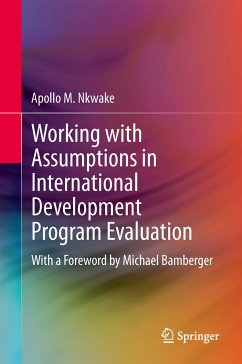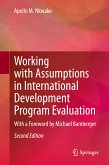Working with Assumptions in International Development Program Evaluation probes their crucial role in planning, and their contributions in driving, global projects involving long-term change. Drawing on his extensive experience in the field, the author offers elegant logic and instructive examples to relate assumptions to the complexities of program design and implementation, particularly in weighing their outcomes. The book emphasizes clarity of purpose, respect among collaborators, and collaboration among team members who might rarely or never meet otherwise. Importantly, the book is a theoretical and practical volume that:
· Introduces the multiple layers of assumptions on which global interventions are based.
· Explores various approaches to the evaluation of complex interventions, with their underlying assumptions.
· Identifies ten basic types of assumptions and their implications for program development andevaluation.
· Provides examples of assumptions influencing design, implementation, and evaluation of development projects.
· Offers guidelines in identifying, explicating, and evaluating assumptions
A first-of-its-kind resource, Working with Assumptions in International Development Program Evaluation opens out the processes of planning, implementation, and assessment for professionals in global development, including practitioners, development economists, global development program designers, and nonprofit personnel.
Dieser Download kann aus rechtlichen Gründen nur mit Rechnungsadresse in A, B, BG, CY, CZ, D, DK, EW, E, FIN, F, GR, HR, H, IRL, I, LT, L, LR, M, NL, PL, P, R, S, SLO, SK ausgeliefert werden.









